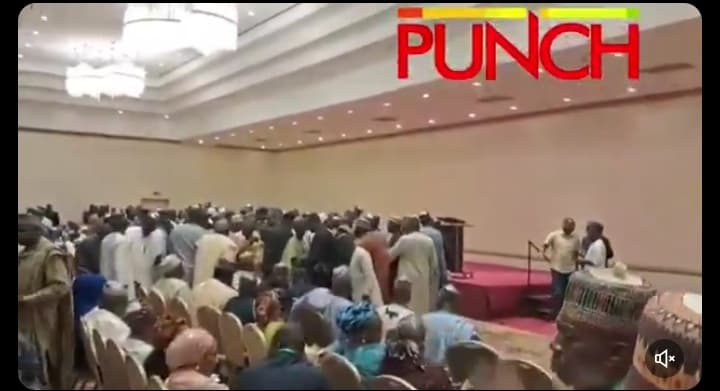A high-stakes coalition meeting aimed at forging a united opposition front for Nigeria’s 2027 presidential election descended into chaos on Sunday, as Jigawa State delegates disrupted proceedings at the prestigious Abuja Continental Hotel. The gathering, organized by the National Political Consultative Group (North), brought together political heavyweights, including former Vice President Atiku Abubakar, former Labour Party presidential candidate Peter Obi, and ex-Rivers State Governor Rotimi Amaechi. What was intended as a strategic session to align opposition forces against the ruling party quickly unraveled, exposing deep-seated tensions and factional rivalries within Nigeria’s political landscape.
A Meeting with High Expectations
The National Political Consultative Group (North), a platform designed to foster collaboration among opposition leaders, convened the meeting to discuss a unified strategy for the 2027 general elections. Nigeria’s political scene has been increasingly polarized, with the ruling All Progressives Congress (APC) facing mounting criticism over economic challenges, insecurity, and governance issues. Against this backdrop, opposition figures like Atiku, Obi, and Amaechi have been exploring alliances to challenge the APC’s dominance.
The Abuja Continental Hotel, a frequent venue for high-profile political gatherings, was abuzz with anticipation as delegates from various states arrived. The agenda reportedly included discussions on coalition frameworks, candidate selection processes, and strategies to mobilize grassroots support. For many Nigerians, the prospect of a coalition featuring Atiku’s political experience, Obi’s populist appeal, and Amaechi’s regional influence held promise for a formidable opposition bloc.
Jigawa Delegates Spark Chaos
The meeting, however, took a dramatic turn when delegates from Jigawa State stormed the venue, protesting what they described as inadequate representation and marginalization in the coalition’s decision-making process. Eyewitnesses reported that the Jigawa contingent, visibly agitated, disrupted speeches and proceedings, chanting slogans and demanding immediate attention to their grievances. The situation escalated as heated exchanges between delegates and organizers threatened to derail the entire event.
Sources close to the meeting revealed that the Jigawa delegates felt sidelined in the coalition’s planning, particularly regarding the allocation of key roles and the inclusion of their state’s interests in the broader opposition strategy. Jigawa, a politically significant state in Nigeria’s northwest, has historically played a crucial role in national elections due to its sizable voter base. The delegates’ frustration underscored deeper concerns about regional and ethnic balance within the coalition, a recurring issue in Nigeria’s complex political landscape.
Key Players Caught in the Crossfire
The disruption placed prominent figures like Atiku, Obi, and Amaechi in a challenging position. Atiku Abubakar, a veteran politician and the Peoples Democratic Party (PDP) presidential candidate in 2019 and 2023, has been a central figure in efforts to unify opposition factions. His presence at the meeting signaled his commitment to building a broad-based coalition, but the chaos raised questions about his ability to mediate internal conflicts.
Peter Obi, whose 2023 presidential campaign under the Labour Party galvanized Nigeria’s youth and southern voters, was seen as a bridge between the old guard and a new generation of political actors. His participation in the coalition talks had sparked excitement among his supporters, who view him as a credible alternative to the status quo. However, the disruption by Jigawa delegates highlighted the challenges of aligning his populist movement with the entrenched interests of traditional political elites.
Rotimi Amaechi, a former APC stalwart and two-term governor of Rivers State, brought his own political clout to the table. Having fallen out with key APC figures, Amaechi’s involvement in the coalition hinted at a potential realignment in Nigeria’s political fault lines. Yet, the unrest at the meeting suggested that even seasoned politicians like Amaechi would struggle to navigate the coalition’s internal dynamics.
Reactions and Next Steps
As news of the disruption spread, reactions poured in from across Nigeria’s political spectrum. Supporters of the coalition expressed disappointment, with some calling for urgent dialogue to resolve the grievances raised by the Jigawa delegates. On social media platforms like X, users debated the implications of the chaos, with some questioning the viability of the coalition and others urging patience as opposition leaders work through their differences.
The National Political Consultative Group (North) issued a brief statement acknowledging the disruption and pledging to address the concerns raised by the Jigawa delegates. Organizers emphasized their commitment to inclusivity and promised to reconvene stakeholders for further discussions. However, the incident has cast a shadow over the coalition’s prospects, with analysts warning that similar disruptions could recur without a clear mechanism for managing internal conflicts.
Join our Whatsapp channel to stay updated always!


